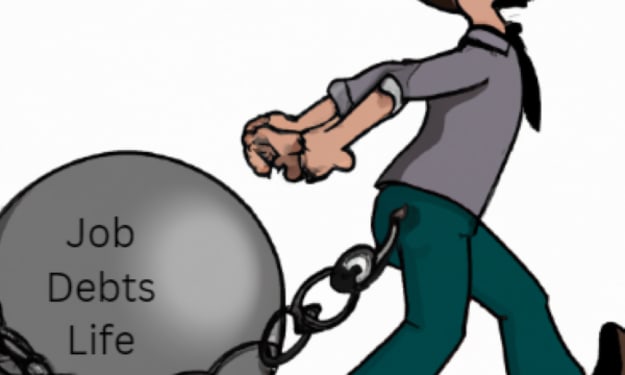Self-Help For The Monkey On Your Back
We all have a weakness, or perhaps a demon, and there is a way to get the monkey off our back. Have you tried a “sin buffer?” How do you choose one that is likely to work? Find out here!

Personal “Sins” or “Demons” That Hurt Us
We all have weaknesses. Maybe yours is gambling, alcohol, sex, or fried goodness. Our demons may have profound impacts on our lives. Even people who keep their demons under control feel the effect, consciously or subconsciously.
Any habit or routine that causes problems in your life, whether realized or not, constitutes a “demon.” Whether you call it an addiction or something you love too much, if problems accompany it, it’s up to you to find solutions. Millions of dollars are spent each year by people seeing psychologists to find ways to conquer these personal problems.
The first order of business is accepting the problem. We’ve all heard the importance of recognizing the problem. What’s next? Self-aware people can often find a suitable distraction or buffer between their sin and its effects. That’s a sin buffer.
Sin buffers can work as a solution for some of our addictions, weaknesses, or demons. They serve as ways to keep our minds off of things influencing our thoughts. They can help fight the pull, the attraction, or the allure of negative influences. Effectively, they are a trade-off.
How To Choose A Sin Buffer
Start by examining your personal “sin” or weakness, your vice. What are you doing that has a negative influence on your life? What do you get from that activity, whether drinking, drugs, gambling, sex, eating, pornography, or other things?
Many of the things we succumb to as people cause releases of chemicals that affect our feelings. These “feel good” hormones that help us experience elevated sensations of joy, peace, contentment, happiness, excitement, and love. Dopamine, endorphins, serotonin, and oxytocin flood our bodies when we enjoy our favorite sin.
If you’re suffering from any one thing you do too much of, you should find a buffer. The sin buffer can be psychological treatment, counseling, or an alternative to distract you from what you’re trying to escape. You can:
- Find your passion.
- Look for things you enjoy.
- Find something that gets you excited.
- Start working out.
- Look to the past for answers.
Take the example of gamblers. What is it about gambling that gets people hooked? The thrill of easy money gets gamblers to play that first time. What keeps them going?
The excitement of the win keeps gamblers coming for more. With each win, they experience a rush. That feeling is the release of dopamine into the system. Dopamine helps feel happiness, pleasure, and reward.
What other factors keep people playing, especially after they lose? There is a thrill gamblers get from the chase. They’re chasing money, sometimes chasing their losses, and then there are the other factors. Listening to the sounds of slot machines, the bright colored lights, and the social interaction at gambling operations all offer excited, happy feelings.
The gambler associates that rush with playing. That dopamine high can become as addictive as heroin is to an addict. Thinking about the chance to get that next fix becomes a constant part of your life, distracting the gambler from their other goals and their lives.
How do you choose a sin buffer, an activity that will distract you from that powerful urge?
Choosing something like fitness will offer the opportunity for rewards. It’s a chance to chase something better, like better health, more ability, and decreased stress. It can fill that time you’d use for playing slots, cards, or whatever your game may be.
Hard addictions, even sexual addictions, can cause worse problems for your health. Those are harder to escape from without understanding them. They can still be helped by finding substitutes. The things that offer the same things as your personal “poisons.”
Ultimately, if you suffer from an addiction, a favorite sin you can’t escape, it’s important to accept you have a problem. The difficulties your favorite sin causes are the evidence you can’t ignore. If you’re one of those people struggling with giving up something you love that was causing you problems, you can help yourself by finding positive substitutes.
If you’re secretly struggling to give up a habit or “sin,” doing anything different is better than nothing.
Takeaways on The Sin Buffer
We all struggle with something. Many of us enjoy something to excess. Those things can become addictive, and anyone can get caught in that cycle. From coffee to chocolate, from food to sex, from gambling to drugs, there are many ways innocuous things can become a problem in our lives. Then, there are inherently risky behaviors, like drugs, alcohol, gambling, and even sexual behaviors.
Even if you’re not going to ask for help, there are ways to help yourself and things you can suggest to others you might know who are struggling. The simple idea of a “sin buffer” can help distract a person. Instead of succumbing to your favorite vice, picking up an old hobby you once loved and revisiting it can reawaken a passion you’ve secretly been missing. That can distract you from those risky, dangerous, and often unhealthy impulses.
Each person has to decide how they fill their time. Will they fill it by learning a new skill, picking up an old skill or hobby, refreshing themselves, or finding substitutes to fill them with joy, happiness, and rewards? It’s hard to break old habits, thus the saying, “You can’t teach an old dog new tricks.” But it’s not impossible. A buffer between you and your vices might do the trick.
What do you think of the idea of the “Sin Buffer?” Do you have a vice or sin you’re trying to give up that having a buffer might help?
References:
About the Creator
Jason Ray Morton
I have always enjoyed writing and exploring new ideas, new beliefs, and the dreams that rattle around inside my head. I have enjoyed the current state of science, human progress, fantasy and existence and write about them when I can.






Comments (2)
It's a good thought, & many may find it helpful. But as you undoubtedly already understand, it's not a one size fits all. In my case, for example, I'm significantly OCD which means simply trading one distraction for another & obsessing over it. There is also the issue for many where it's not so much about feeling good as it is about not feeling bad. Quite frequently, those who are addicted to something are attempting to numb whatever pain it is they are experiencing. A sin blocker may help for a time, but it's not likely to alleviate the problem unless it also provides a numbing relief--in which case the chances of simply trading one addiction/demon for another would be significant. All of that having been said, a sin blocker could be a helpful tool when accompanied by other coping strategies, including as you have mentioned, being honest with ourselves.
I agree, I love potatoes chips. When I mean love it with addiction. I can eat a whole bag of chips all by myself in one seating. I replace it unsalted pistachios. This a great self help advice 👌👍